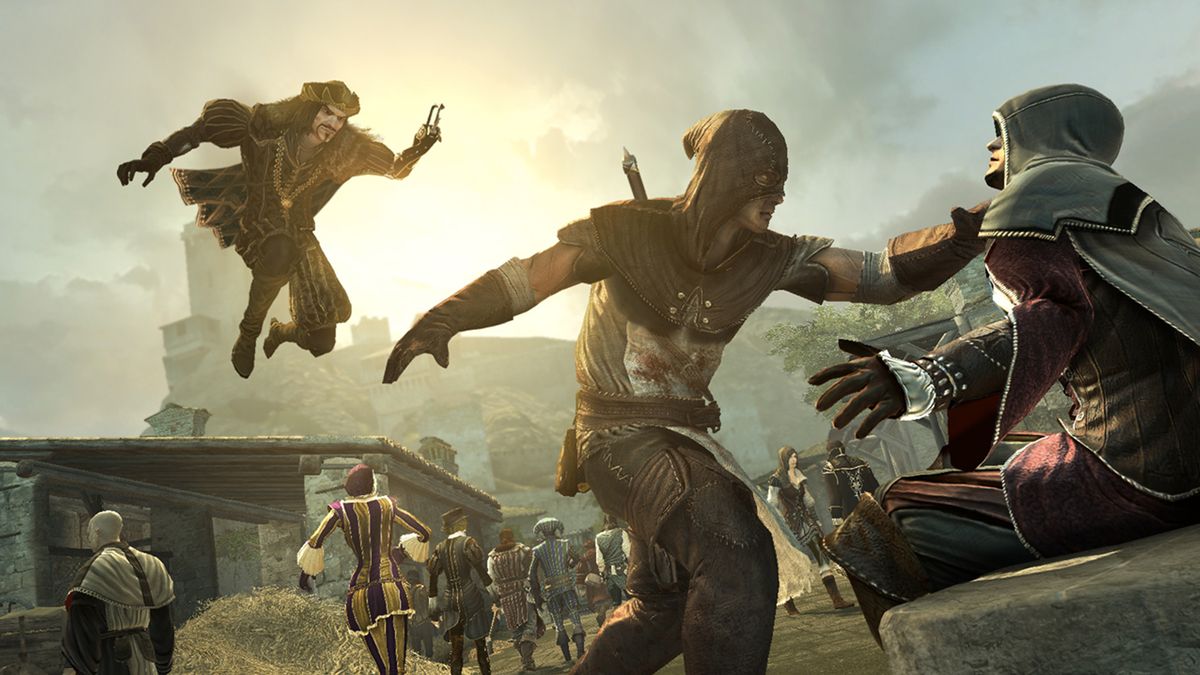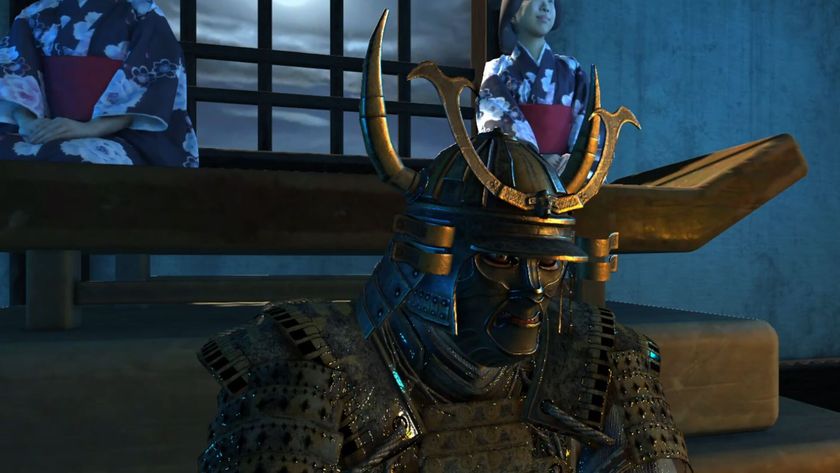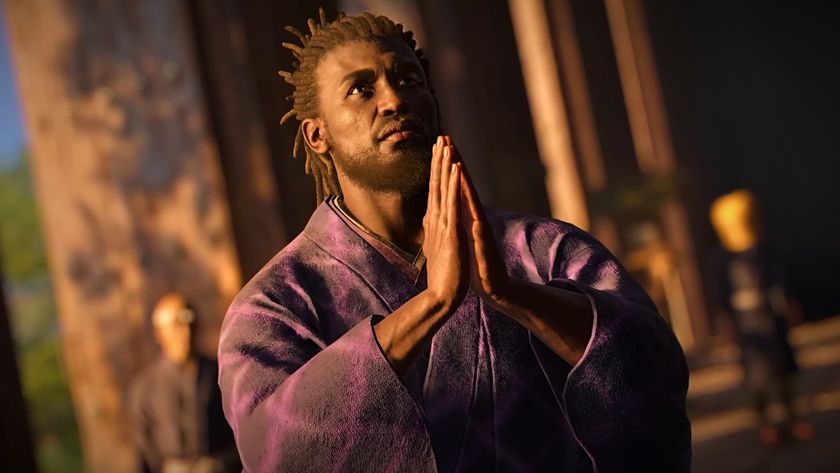There's never been a better time to bring back the stealth multiplayer of Assassin's Creed: Brotherhood
As Ubisoft shifts its focus to 'high-end free-to-play', Assassin's Creed should reinvest in its stealth multiplayer

It was only recently that Ubisoft revealed it would soon focus more on its free-to-play efforts, leading many to question the future direction of the publisher's most established franchises. Is Far Cry destined for the battle royale treatment? Are paid-for cosmetics in The Division here to stay? Will the real treasure in Skull and Bones end up being our bank balance? Such hypothetical examples are extreme, yet the overt trepidation voiced by a certain sect of players isn't unfounded considering some of the industry's past attempts to merge "fremium" and AAA concepts.
Regardless, given that Assassin's Creed is one of the biggest and most enduring IPs in Ubisoft's stable, it would seem only natural for the series to experiment with free-to-play in the future. While The Division: Heartland will be charting its own path through these waters, there's no need for Assassin's Creed to start from scratch, especially when a cool (and under-appreciated) multiplayer blueprint for the series already exists.
Join the Brotherhood

It was in 2010's Assassin's Creed: Brotherhood specifically, during the Ezio trilogy's exciting middle chapter, that Ubisoft realized what dedicated PVP in an Assassin's Creed game could look like. The publisher introduced a suite of modes like Wanted, Escort, and Chest Capture that stayed true to what it meant to be an assassin, acting as a competitive playground full of sneak-centric risk/reward opportunities where approaching enemies directly was frowned upon. Instead players were challenged to hide in plain sight, do their best to blend in with the NPC crowds, all while waiting patiently for the perfect moment to strike their designated target. The idea was moreish if not especially complex, but trying to outwit real-world rivals using cunning and stealth alone felt on brand for Assassin's Creed, and was unlike anything else out there.
Your ultimate goal was to score the highest number of points by taking down as many targets as possible in quick succession. The only information you'd have to go on, though, was that the target would be in one of 21 different guises. From here, it'd be a simple case of tracking your victim using the on-screen radar beacon to follow your victim's direction, harnessing your character's specific perks and any accrued streak bonuses to spot unnatural movements before moving in for the kill. This chessboard-like setup allowed for several tense games of cat and mouse, especially since you knew that, as well as having a target on your own back, you were also always prey to someone else's pursuit, too.
Was dashing closer towards a target worth giving away your own position? Not always. A lot of the time the most successful players were the ones who played the game the stealthiest, learning the various maps' layouts so as to utilise hiding spots effectively. You never knew when your own sneaky efforts were compromised, which made getting suddenly assassinated from either behind or above feel shocking. Even the act of getting away after pulling off a kill yourself incurred its own risk, as for a brief moment your true nature would be made clear to any onlookers. This made playing defensively using smoke bombs, a decoy and such, just as important as knowing when to break cover.

"As Ubisoft looks to significantly step up its free-to-play focus, it'd be wise to reinvest in Assassin's Creed's original competitive multiplayer template"
Ubisoft poured a lot of effort into Brotherhood's multiplayer portion, going so far as to even provide an in-universe explanation for its inclusion. Once again set entirely in the Animus, each match is framed as a training session where players take on the roles of Templars at an Abstergo facility who are using the memories of their ancestors to acquire new skills – courtesy of the "bleeding effect". This perfectly fed into the multiplayer's built-in progression system, which rewarded players with improved skills and abilities the more they ranked up. Such ideas continued to be further refined and built upon in every subsequent sequel until Assassin's Creed: Unity in 2014, when the assassin-versus-assassin template was eventually replaced by four-player co-op.
However, as Ubisoft looks to significantly step up its free-to-play focus, it'd be wise to reinvest in Assassin's Creed's original competitive multiplayer template. Because despite having a small, dedicated player base on PC over ten years after it was first introduced, this stealthier attempt at PvP still has its charms, and could greatly benefit from being the main attraction of a polished product, rather than being brushed away by most as an experimental add-on with nothing to offer. Not all of Brotherhood's mechanics would lift perfectly over into a modern game – the series' continued innovations into RPG territory prove that – but the foundation is there for a form of multiplayer that rewards player patience.
Sign up to the 12DOVE Newsletter
Weekly digests, tales from the communities you love, and more
Free-to-play focus

Ubisoft is slowly making inroads into the free-to-play market and it hasn't found immediate success, at least not on the same scale as Activision and EA. Hyper Scape, for all its brief flitters of fun and creativity, failed to set the world alight, paling in comparison to other popular battle royales like Apex Legends and Call of Duty: Warzone. Perhaps the next step should be to invest in something fresh and totally unique – playing to Ubisoft's strengths, rather than chasing trends. That's why Assassin's Creed's stealth PvP is well worth revisiting: because there's a gap in the market for a slow-paced and more strategic multiplayer experience that doesn't play out down the sights of a gun.
Contrary to popular belief, Ubisoft should be a leader in any field it wants to be in to be successful, not a follower. Innovating upon the core pillars of Assassin's Creed: Brotherhood's multiplayer when it inevitably considers how to adapt this – its biggest franchise – for the free-to-player market would be a good way of doing this. The building blocks are already there for such a template to be taken a lot further within the modern multiplayer space, and it doesn't mean the publisher can't take slight inspiration from the likes of Overwatch or even Rainbow Six: Siege by way of implementing operator-style hero characters, cosmetic rewards and of course season pass. My only hope is that when attempting to go free-to-play, Assassin's Creed at least considers making strategic stealth its cornerstone.
Aaron is a freelance writer who appreciates a good video game story just as much as great visuals and gameplay. Having covered the subject for places like WIRED, Den of Geek, PLAY Magazine, NME, PC Gamer and more, he’s well equipped to discuss a range of topics and industry goings-on through in-depth features, developer interviews and thoughtful reviews. His favourite game ever is 2005’s TimeSplitters: Future Perfect, a madcap character shooter from the makers of GoldenEye 007 that he first played whilst on holiday in Butlin’s Minehead. Because who needs to have fun in the sun, anyway?
Most Popular









